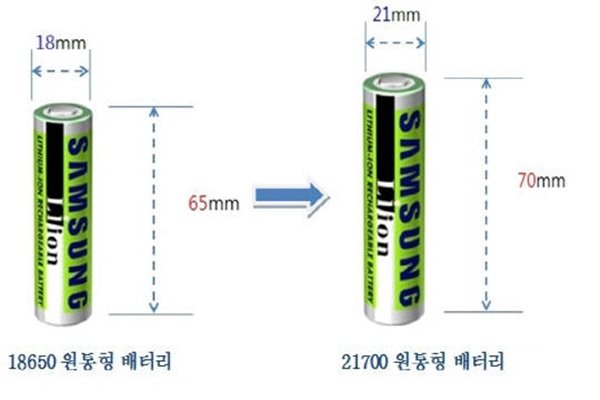Samsung SDI and LG Chemicals are going to mass-produce 2nd generation cylindrical batteries for electric vehicles by end of this year.
As Tesla is introducing Panasonic’s 2nd generation cylindrical batteries for its next popular electric vehicle model, LG Chemicals and Samsung SDI are also working to enhance their cylindrical batteries. It is heard that South Korean batteries are somewhat better than Panasonic’s batteries in capacity.
It is heard that other global electric vehicle manufacturers are also weighing on using 2nd generation cylindrical batteries that are more advantageous in long-distance driving ability, speed, and design. It will be interesting how much demands LG Chemicals and Samsung SDI will be able to secure from electric vehicle manufacturers.
According to related industries on the 6th, Samsung SDI and LG Chemicals are going to release their 2nd generation small cylindrical secondary batteries (21700) by end of this year. Panasonic, LG Chemicals, and Samsung SDI, which are number one, two, and three in global battery markets for electric vehicles, are going to collide against each other again in markets for next-generation cylindrical batteries.
Tesla has decided to use Panasonic’s ‘21700’ batteries for its popular electric vehicle called ‘Model 3’, which will be released this month, and finished verifications after going through some ESS (Energy Storage System) products for households. Capacity of Panasonic’s 21700 battery is about 4,500 mA while capacities of LG Chemical’s 21700 battery and Samsung SDI’s battery are heard to be between 4,700mA and 4,900mA and later-end of 4,500mA respectively.
In order to minimize risk, LG Chemicals and Samsung SDI are going to feel out their current markets (electric tools and electric bicycles) and are planning to expand their markets with batteries for electric vehicles in the future. They also remodeled their current lines for cylindrical 18650 batteries in order to minimize facility investments.

‘21700’ is the second generation of ‘18650’, which is a cylindrical battery that was sold the most in mankind’s history. Its volume and capacity increased by 47% and between 30 and 40% compared to ‘18650’. Because its credibility such as quality of single cell has increased greatly, it displays stable performance in design and process for making capacity of a battery bigger and for controlling charge and discharge. If 1,000 18650 batteries were used for single electric vehicle, now it only takes 700 21700 batteries for single electric vehicle.
“Although we cannot say that energy density of 21700 battery has increased, quality of single cell such as QC (Quality Control), which is the most important, has improved greatly.” said Professor Park Cheol-wan who is an expert in batteries. “Since there are more rooms to improve energy density of 21700 compared to 18650, use of 21700 batteries will grow in future markets for electric vehicle batteries.”
It is heard that Lucid Motors and Faraday Future, which are electric vehicle startup companies, decided to use 21700 batteries for their electric vehicles and are currently discussing with LG Chemicals and Samsung SDI regarding their batteries. Also an influential European automotive manufacturer has decided not to divide orders of batteries for its electric vehicles into small and medium and large batteries. This indicates that it will be more advantageous for South Korean companies to secure customers compared to how Panasonic only depends on Tesla.
On the other hand, Japan’s Murata Manufacturing Co., Ltd., which acquired SONY, and China’s Lishen also secured technologies for 18650 cylindrical batteries and are planning to expand their businesses towards 21700 batteries in the future.
Staff Reporter Park, Taejoon | gaius@etnews.com